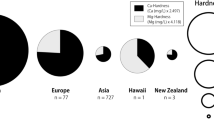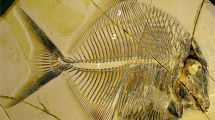Abstract
I HOPE that Capt. Palmer's letter will induce officers of the Indian Marine to investigate any cases of “White Water” that come under their notice. I am sure that the director and staff of the Indian Museum at Calcutta, where the collections of the I.M.S. investigator are deposited, will give them every assistance, and examine any specimens they may obtain. We want to know what are the organisms concerned in the production of the phosphorescence, and the physical conditions of the water in which they were living. The organisms can be strained out of the water by a silken or muslin net—or the hose turned to run through a piece of either cloth—and preserved in spirit or formic aldehyde (1 part in 30 of sea-water). They should be accompanied by exact information as to position, state of weather and moon, and temperature of the water; a sample of the actual water in a green beer-bottle would also be useful.
This is a preview of subscription content, access via your institution
Access options
Subscribe to this journal
Receive 51 print issues and online access
$199.00 per year
only $3.90 per issue
Buy this article
- Purchase on Springer Link
- Instant access to full article PDF
Prices may be subject to local taxes which are calculated during checkout
Similar content being viewed by others
Author information
Authors and Affiliations
Rights and permissions
About this article
Cite this article
GARDINER, J. “The White Water”. Nature 104, 563–564 (1920). https://doi.org/10.1038/104563c0
Issue Date:
DOI: https://doi.org/10.1038/104563c0
Comments
By submitting a comment you agree to abide by our Terms and Community Guidelines. If you find something abusive or that does not comply with our terms or guidelines please flag it as inappropriate.



